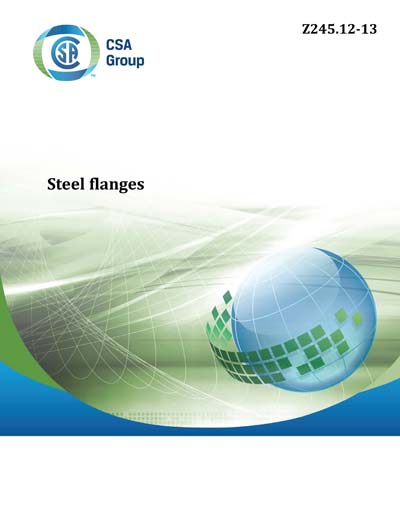Historical
CSA Z245.12-2013
Z245.12-13 - Steel flanges
Preface
This is the seventh edition of CSA Z245.12, Steel flanges. It supersedes the previous editions published in 2009, 2005, 2001, 1996, 1991, and 1985. This Standard covers the requirements for steel flanges intended to be used for transporting fluids as specified in CSA Z662. Changes to this edition include the following: a) new definition of Grade (Clause 3); b) revised quality program requirements (Clause 4.4); c) revised requirements for sour service (Clause 13); and d) revised Charpy V-notch tests methods (Clause 15.6).Scope
1.1 General This Standard covers wrought steel welding neck and blind flanges primarily intended for use in oil or gas pipeline systems. 1.2 Size, grade, nominal pressure class, and category 1.2.1 Size This Standard covers flanges in sizes from NPS 1/2 to NPS 60. (See Table A.1.) 1.2.2 Grade For other than sour service, this Standard covers flanges from Grade 248 to Grade 690. For sour service, this Standard covers flanges from Grade 248 to Grade 483. Note: The standard grades are Grades 248, 290, 317, 359, 386, 414, 448, 483, 550, 620, and 690 (see Table 4); however, intermediate grades are also permitted. 1.2.3 Nominal pressure class This Standard covers flanges having cold working-pressure ratings designated by nominal pressure classes from PN 20 to PN 420. The standard nominal pressure classes are shown in Table 1. (ASME class designations are shown in Table B.1.) 1.2.4 Category This Standard covers flanges in the following categories: a) Category I: flanges without requirements for proven notch-toughness properties; and b) Category II: flanges with requirements for proven notch-toughness properties. 1.3 Assemblies This Standard does not cover assemblies. Note: An assembly is a grouping of fittings or flanges, or both, joined by one or more circumferential welds. 1.4 Terminology In this Standard, shall is used to express a requirement, i.e., a provision that the user is obliged to satisfy in order to comply with the standard; should is used to express a recommendation or that which is advised but not required; and may is used to express an option or that which is permissible within the limits of the Standard. Notes accompanying clauses do not include requirements or alternative requirements; the purpose of a note accompanying a clause is to separate from the text explanatory or informative material. Notes to tables and figures are considered part of the table or figure and may be written as requirements. Annexes are designated normative (mandatory) or informative (non-mandatory) to define their application.Content Provider
CSA America, Inc. [csa]






